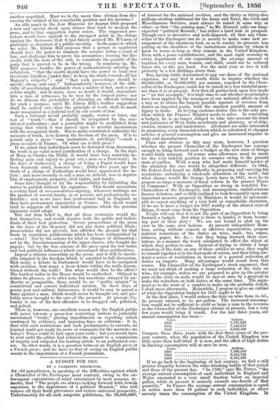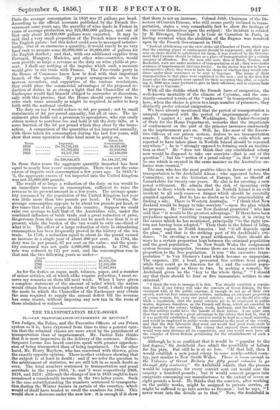A BUDGET FOR 1857.
BY A PATRIOTIC PROJECTOR.
AN old pamphleteer, in speaking of the difficulties against which a Chancellor of the Exchequer must contend, owing to the ex- travagant expectations of relief entertained by most persons, re- marks, that " The people are always looking forward with Jewish eagerness to the appearance of a political Messiah," who will remove all their fiscal grievances and restore universal prosperity. 'Unfortunately for all such sanguine politicians, the 28,000,000/.
of interest for the national creditor, and the thirty or thirty-five millions sterling additional for the Army and Navy, the Civil and Miscellaneous Services, must always be raised in some way or other ; so that " the coming man," as Mr. Disraeli calls our long- expected "political Messiah," has rather a hard task in prospect. Though.ever so inventive and well-disposed, all that any Chan °eller of the Exchequer can do is merely to make some new ar- rangement of the enormous load, so as to render its pressure less galling on the shoulders of the industrious millions by whom it must be borne so long as they remain in the United Kingdom. Even with a peace establishment, and the most rigid economy in every department of our expenditure, the average amount of taxation for every man, woman, and child, could not be reduced y
below 40s. or 42s. peru:hns above that.e will rad. For the next year or two it wi probabl be a few ish
But, having fairly determined to pay our share of the national expenses, we may find it worth while to inquire whether the 60,000,0001. or 70,000,000/. per annum, required by the Chan- cellor of the Exchequer, could not be raised in a less wasteful man- ner than it is at present. Now that all parties look upon free trade as " un fait accompli," it is high time to ask whether itsprinciples have been applied by the managers of our national affairs in such a way as to obtain the largest possible amount of revenue from duties on imported goods, with the smallest possible amount of injury to trade. In levying customs-duties this is the only pro- blem which the Finance Minister needs to solve. In concocting a budget, he is no longer obliged to take into account the fears and jealousies of West India merchants and planters, or of ship- owners, farmers, and landowners. All classes are alike interested in promoting every financial reform which is calculated to cheapen articles of general consumption and give an increased impulse to trade and manufactures.
Plain and obvious as this may seem, however, I question whether the present Chancellor of the Exchequer has courage enough to bring forward such a budget as the new state of things would fairly warrant. Of course some allowance must be made for the very ticklish position he occupies owing to the present state of parties. With a man who had made himself master of the situation the case would be altogether different. In lea, Sir Robert Peel found no difficulty in proposing and carrying his resolutions embodying a wholesale alteration of the tariff; but what chance would Sir George Lewis have in 1857, were he to propose as large a measure of fiscal reform in the present House of Commons ? With an Opposition so strong in watchful Ex- Chancellors of the Exchequer, and unscrupulous, ambidextereus finance debaters, and so little inclined to look favourably upon any important measure proposed by Ministers, it would be unreason- able to expect anything of a very bold or remarkable character. If we are to have a budget for 1857 worthy of the altered state of things, it must come from the Opposition. People will say that it is not the part of an Opposition to bring forward a budget. But what is there to hinder, it from becom- ing part of their duty? We are not bound to plod on for ever in the same slow fashion. At present independent Mem- bers, acting without concert or effective organization, propose isolated reductions of the duties on wine, malt, tea, sugar, tobacco, paper, &c. &c. ; but they bring forward their reso- lutions in a manner the worst calculated to effect the object at which they profess to aim. Instead of trying to obtain a large reduction of the duty on any of these articles at once, they ought to consult together as to the best mode of action, and then bring for- ward a series of resolutions in favour of a general reduction of duties on imports. Many advantages would result from this course. The Chancellor of the Exchequer's stock argument, that we must not think of making a large reduction of the duty on wine, for example, unless we are prepared to give up the greater part of the duty on malt, would be met at once by a proposal to make the reduction on both duties at the same time. The argu- ment as to the want of a surplus to make up the probable deficit, I shall meet afterwards. Meanwhile, I propose to give an outline of what the Opposition budget for 1857 ought to be. In the first plane, I would reduce the duty on wine from Ss. 6d., its present amount, to is. per gallon. The increased consump- tion would not be sufficient to yield as large a sum to the revenue as the Chancellor of the Exchequer obtains at present, but a very few years would bring it round. For the last three years, our annual consumption has been—
Years. Gallons.
1853 7,197,820 1854 7,149,612 1855 6,670,368
Compare these three years with the first three years of the pre- sent century, when the population of the United Kingdom was little more than half what it is now, and the effect of high duties in limiting consumption will at once be seen.
Years. Gallons.
1801 7,006,310 1802 6,355,792 1803 ... 8,181,466
If we go hack to the beginning of last century, we find a still greater disparity between the wine-drinking habits of that period and those of the present day. "In 1700," says Mr. Porter, "the average annual consumption of each individual in England and Wales amounted to a very small fraction below an imperial gallon, while at present it scarcely exceeds one-fourth of that quantity." In France the average annual consumption is equal to rather more than 19 gallons to each individual, or above seventy times the consumption of the United Kingdom. In Paris the average consumption in 1850 was 27 gallons per head. According to the official accounts published by the French Go- vernment some years ago, the quantity of wine made in France in years of average production was 924,000,000 gallons, and out of that only about 25,000,000 gallons were exported. It may be said that a very small proportion of the French wines would suit the English palate : but this defect could soon be managed satisfac- torily. Out of so enormous a quantity, it would surely be no very hard task to prepare some 20,000,000 or 30,000,000 of gallons for the English market.; and that, with our additional supplies from Portugal, Hungary, Madeira, and other wine-countries, would soon provide as large a revenue as the duty on wine yields at pre- sent. I shall say nothing of the impulse which such a measure would give to our trade with France. The Free-trade party in the House of Commons know how to deal with that important branch of the question. By proper arrangements as to the movers, seconders, and supporters of the various resolutions, they could place the commercial advantages of the proposed re- duction of duties in so strong a light that the Chancellor of the Exchequer would find himself obliged to surrender at discretion, only with this proviso, that the House should empower him to raise such sums annually as might be required in order to keep faith with the national creditor.
The duty on tea I would reduce to 6d. per pound ; not by small instalments of 3d. per pound annually, but all at once. The in- stalment plan holds out a premium to speculators, who can easily obtain money to purchase tea and hold it till the duty falls, at a mere fraction of the 3d. per pound which they clear by the trans- action. A comparison of the quantities of tea imported annually, with those taken for consumption during the last few years, will show that some operation of this kind must be going on.
Taken for Consumption.
lbs.58,834,087 61,953,041 63,430,693 lbs.184,217,781
In -those three years the aggregate quantity imported has been equal to nearly four years' consumption. There was not the same excess of imports over consumption a few years ago. In 1843-'4- '5, the aggregate excess of tea imported into the United kingdom was not 25,000,000 pounds.
The result of so large a reduction of the duty on tea would be an immediate increase in consumption, sufficient to raise the revenue to its present amount in a few years. The -average'quan- tity consumed by the population of the United Kingdom last year was little more than two pounds per head. In Victoria, the average consumption appears to be about ten pounds per head, or five times that of the people in this country. Suppose we could raise our average to half that of the Australian rate, under the combined influence of brisk trade and a great reduction of price, the.revenue from this source would net be much less than it is at present, while the burden of the tax would be only one-third of what it is. The effect of a large reduction of duty in stimulating consumption has been frequently proved in the history of the tea trade. In 1746, a reduction equal to about 2s. the pound caused an increase in a single year of about 200 per cent. In 1784, the duty was Is. Icier pound, 67 per cent on the value ; and the quan- tity consumed was not quite 5,000,000 pounds. In 1785, the rate was reduced to 124 per cent, and the consumption rose in that and the two following years as under—
Years. Pounds.
1785 10,856,578 1786 12, 359, NO 1787 17,047,054
As for the duties on sugar, malt, tobacco, paper, and a number of minor articles, all of which alike require reduction, I must re- serve my remarks on them till next week. When I have given a complete statement of the amount of relief which the nation would obtain from a thorough reform of the tariff, I shall explain the mode in which the Chancellor of the Exchequer may obtain the sum required to supply the annual deficit till the revenue has come round, without imposing any new tax in the room of those abolished or reduced.
Years. Imported.
1853 11)8.70,735,135 1854 85,792,032 1855 83,117,706
lbs.239,644,873



































 Previous page
Previous page